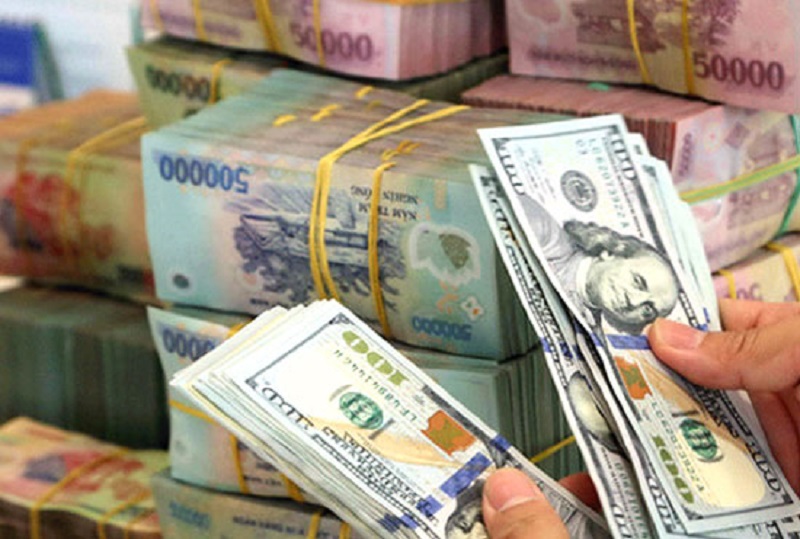Will SBV's bill issuance restrict cash inflows into the stock market?
During this morning's trading session on March 12th, the VN-Index recovered with a strong upswing, witnessing a spike in numerous equities.
This suggests that the SBV's recent action in issuing and selling bills has had little influence on the stock market.
Specifically, by the end of this morning's session, the VN-Index had gained by 8.06 points (0.65%), to 1,243.55. On the HoSE board, 246 equities advanced and 182 declined, with roughly 415 million shares traded for 10,278.6 billion VND, a 7% rise in both volume and value over yesterday morning's session. Block transactions contributed about 22.8 million shares, worth 445.7 billion VND.
The HNX saw 77 stocks advance and 57 decline, with the HNX-Index closing up by 0.96 points (0.41%) at 234.81 points. The entire matching volume surpassed 37.5 million shares, valued at 808.3 billion VND. Block transactions added another 5.4 million shares, worth 104.4 billion VND.
The UpCoM-Index climbed by 0.09 points (0.1%) to 90.75 points. The overall matching volume exceeded 14.7 million shares, valued at 198.7 billion VND. Block transactions added more than 1 million shares, worth 33.3 billion VND.

Thus, all three exchanges are showing positive increases, while investors are trading carefully and may be waiting for volatility or adjustments in the afternoon session. The most obvious indicator is that the money flow has not decreased. This contrasts with prior worries that the SBV's net withdrawals would restrict money flow into the stock market, which was cited as the cause of yesterday's dramatic market collapse.
After a four-month hiatus, the SBV abruptly started selling banknotes on March 11th, withdrawing approximately 15,000 billion VND from the system. Most experts believe that this move by the SBV is an appropriate regulatory measure given the current context of abundant system liquidity but limit ed lending (with slow credit growth in the first two months of the year and commercial banks continuing to maintain low deposit rates); meanwhile, the exchange rate is fluctuating with the "black market" rate rising, and the SJC gold price setting a record exceeding 82 million VND per tael, which is still being traded on the market.
Regarding the potential impact of the SBV's net withdrawal action through bill issuance yesterday on the stock market, Mr. Huynh Minh Tuan, Chairman of FIDT's Board of Directors, believes that this could slightly tighten liquidity on the interbank/market, especially if such withdrawal actions continue in the near future. Depending on the rate at which the SBV withdraws funds in the near term, or the short-term speculating trend in cryptocurrencies and gold.
"The stock market's liquidity has recently stayed over 23 trillion VND every session, owing to excess liquidity in the banking system and historically low interest rates flowing across the economy. With the tightening of surplus money on the interbank market, there may be fears that the stock market's buying demand may fall owing to short-term liquidity problems and investor moods toward risk. The SBV's net withdrawal through bills is not expected to affect the deposit-loan interest rate structure of the banking system in Q2/2024, given that credit growth has not yet significantly recovered. However, the risk of increased speculation in cryptocurrencies and gold should be seen as a local risk for Vietnam in the short term, which regulators are recognizing. After this period, we can expect a better market trend," shared Mr. Tuan.
Mr. Tuan also feels that speculative flows into the cryptocurrency and gold markets (forex - not authorized) are the primary source of exchange rate pressure. Both markets are currently at all-time highs, as speculative movements strengthen, resulting in a succession of uninterrupted peaks. Significant investment quantities are likely to cause considerable market swings and exchange rate pressure.
The SBV's defense of medium-term exchange rate expectations (Vietnam's banking exchange rate threshold at 24,800 - 25,000, similar to the USD/JPY threshold of 150 - 152, with a safe fluctuation margin of < 3% per year) could be achieved in a positive economic recovery context.
Mr. Tuấn underlined that the impact of the SBV's net withdrawal through bill issuance may be short-term, with a more positive environment than in November 2023.








